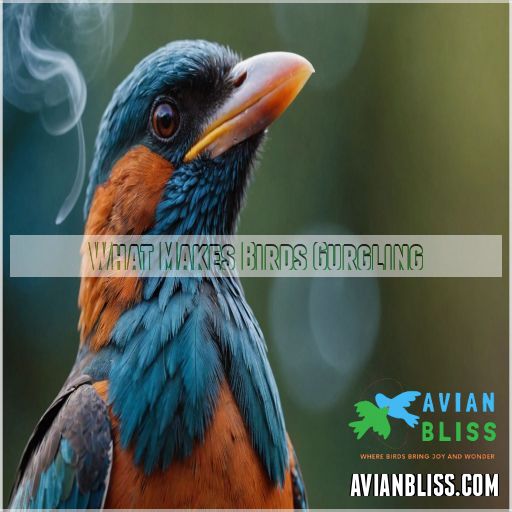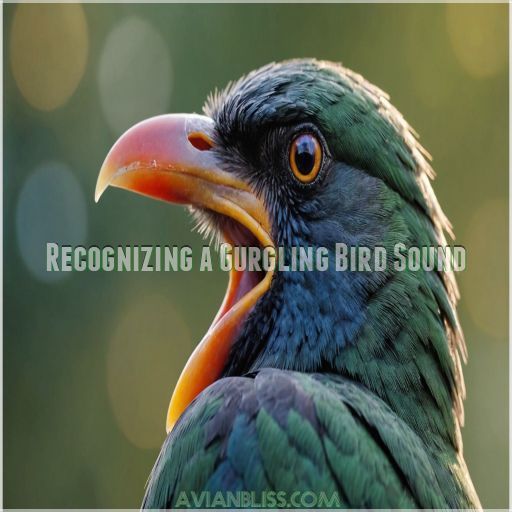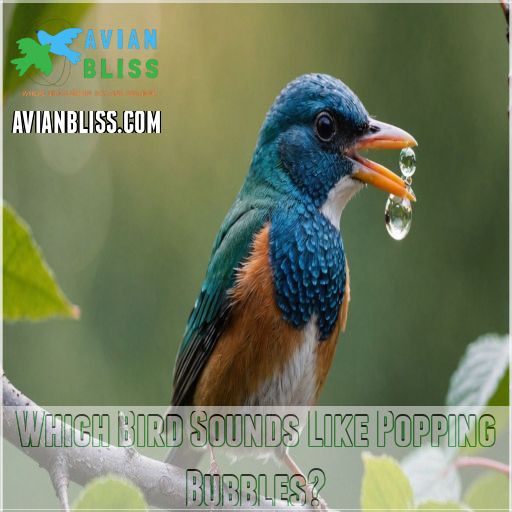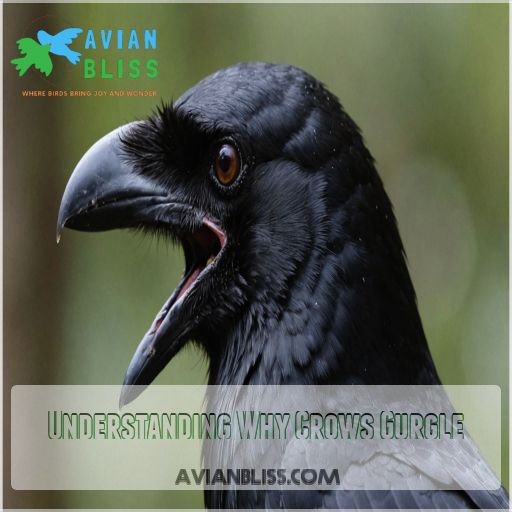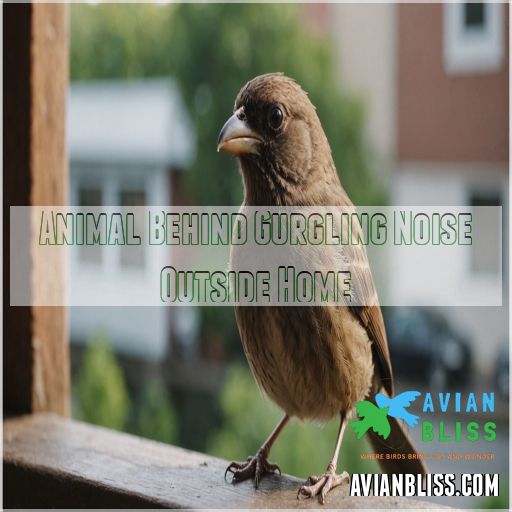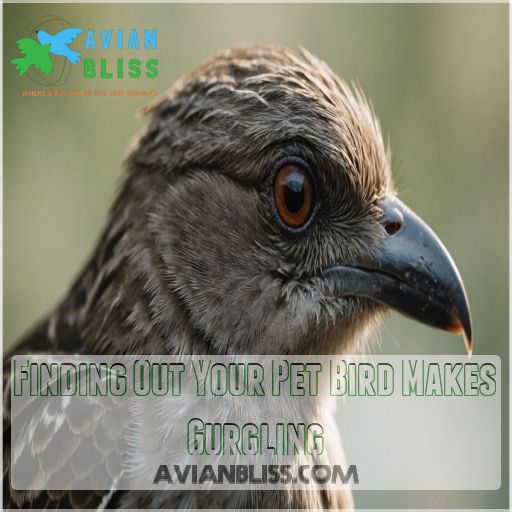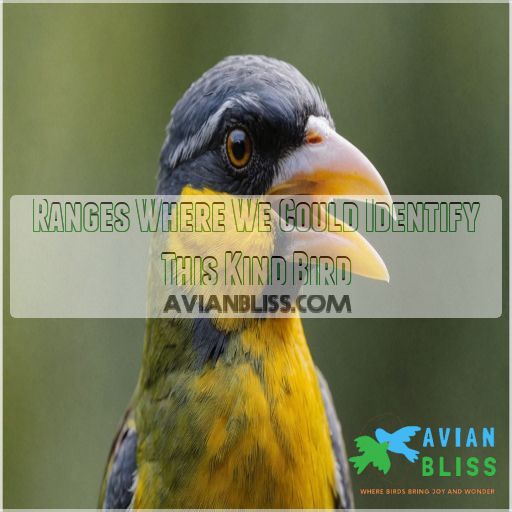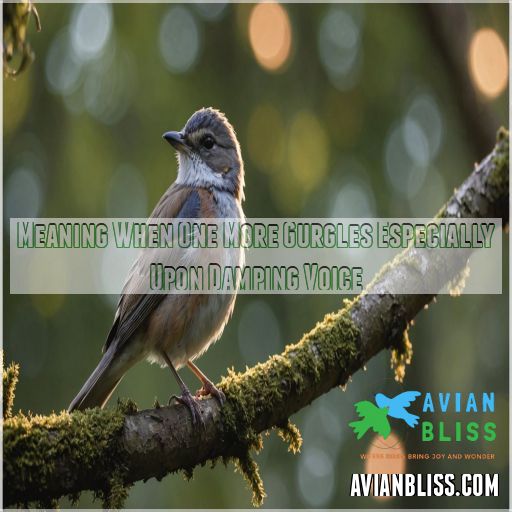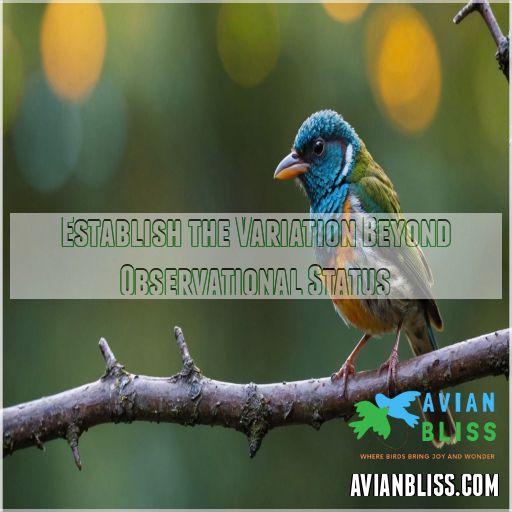This site is supported by our readers. We may earn a commission, at no cost to you, if you purchase through links.
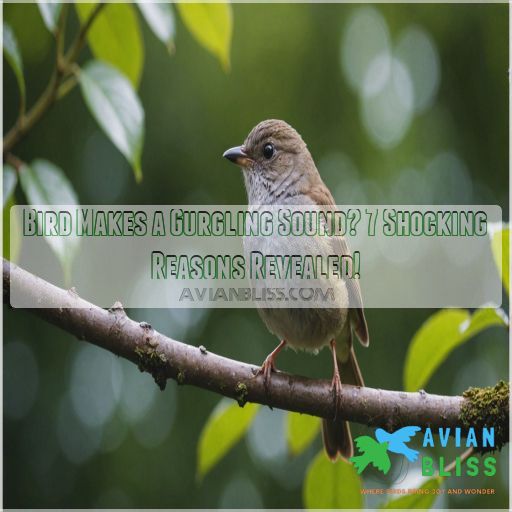
It could be a love song to attract a mate, a warning to ward off predators, or just a friendly chat with their flock. Different species have their own gurgling styles – from the soft, chirpy gurgles of raccoons to the deep, resonant croaks of frogs.
But with your feathered friends at home, unusual gurgles might signal something’s amiss. Ready to dive deeper into bird gurgles?
Table Of Contents
- Key Takeaways
- What Makes Birds Gurgling
- Recognizing a Gurgling Bird Sound
- Which Bird Sounds Like Popping Bubbles?
- Understanding Why Crows Gurgle
- Animal Behind Gurgling Noise Outside Home
- Finding Out Your Pet Bird Makes Gurgling
- Ranges Where We Could Identify This Kind Bird
- Meaning When One More Gurgles Especially Upon Damping Voice
- Establish the Variation Beyond Observational Status
- Frequently Asked Questions (FAQs)
- Which bird makes a gurgling sound?
- Why is my bird gurgling?
- What does it mean when a crow makes a gurgling sound?
- What bird sounds like popping bubbles?
- How do different bird species gurgling sounds vary?
- Can gurgling indicate health issues in birds?
- What time of day do birds typically gurgle?
- Are there regional differences in bird gurgling behaviors?
- How does habitat affect birds gurgling sounds?
- Conclusion
Key Takeaways
- You’re not imagining things – birds really do make gurgling noises! These liquid-like sounds come from their unique vocal organ called the syrinx, which lets them produce a whole symphony of bubbly tunes. It’s like they’ve got a built-in sound mixer in their throats!
- When you hear a bird gurgling, it’s not just random noise – they’re trying to tell you something. It could be a love song to woo a mate (a bird’s version of a cheesy pickup line), a warning to scare off predators (their "back off, buddy!" call), or just friendly chatter with their flock (bird gossip, anyone?).
- Different bird species have their own gurgling styles, from soft chirps to deep croaks. Learning to identify birds by song can be a fun challenge, and with practice using recordings and study aids from bird song resources, you can become a pro. It’s like a feathered version of "Name That Tune" – with practice, you can learn to identify birds just by their gurgles. Who knows, you might become the Sherlock Holmes of bird calls in your neighborhood!
- While gurgling is usually normal, keep an ear out for changes in your pet bird’s sounds. If their usual melodious gurgle turns into something that sounds more like a broken record, it might be time for a trip to the vet. After all, you want your feathered friend hitting all the right notes!
What Makes Birds Gurgling
Ever wondered why some birds sound like they’re gargling mouthwash? You’re not alone! Birds make gurgling sounds for a variety of fascinating reasons. It’s all about their unique vocal anatomy and how they use it. Unlike humans, birds have a syrinx – a special voice box that allows them to produce complex vocalizations. When air passes through this organ, it can create bubbling or gurgling noises, especially in species with particularly intricate syrinxes.
But it’s not just anatomy at play here. Birds might gurgle to communicate with their flock, attract mates, or even ward off predators. Some species use gurgling as part of their courtship rituals – it’s like their version of sweet talk! Environmental factors can also influence these sounds. For instance, a bird’s gurgle might change pitch or intensity based on the time of day or season. So next time you hear a bird gurgling, remember: there’s a whole lot of science and nature behind that quirky sound!
Recognizing a Gurgling Bird Sound
Occasionally, you’ll hear a sound that makes you pause and wonder, "Was that a bird gurgling?" Recognizing these unique calls can be tricky, but with practice, you’ll become a pro at identifying gurgling birds. Listen for a liquid, bubbling noise that’s distinct from typical chirps or tweets. It might remind you of water flowing or bubbles popping in a glass.
Some birds, like crows, produce a deep, throaty gurgle, while others create higher-pitched, more melodic gurgles. Pay attention to the rhythm and duration of the sound – is it a short burst or a longer, continuous gurgle? To hone your skills, try recording the sounds you hear and comparing them to online bird call databases. Don’t be surprised if you find yourself becoming a bit of a bird communication expert! Remember, each gurgle tells a story about the bird’s behavior, mood, or needs.
Which Bird Sounds Like Popping Bubbles?
Have you ever heard a bird sound that reminds you of bubbles popping?
You’re about to discover which feathered friend makes this unique gurgling noise and learn how to distinguish it from other similar sounds in nature.
Distinguish Gurgling Sounds From Similar Noises
Many bird sounds can be tricky to differentiate.
You’ll need to train your ear to distinguish gurgling from clicking, popping, or bubbling noises.
Some birds, like the American Bittern, produce a unique "glug-glug" that’s often mistaken for water gurgling.
Listen closely – is it a continuous sound or separate notes? Does it have a rhythm?
By honing your skills, you’ll soon become a pro at identifying these fascinating avian vocalizations.
Combining Bird-sightings and Their Associated Sounds
Now that you can tell gurgling apart from other bird sounds, it’s time to pair those noises with the birds you see.
Imagine this: you’re out birding, and you hear what sounds like popping bubbles.
You look around and spot a crow nearby. Bingo! You’ve just matched a unique call to its feathered friend.
This detective work is key to becoming a bird sound pro.
Developing Skills in Sound-association for Species
You’ve seen the birds, now let’s match their sounds! Developing your sound-association skills is like learning a new language – it takes practice.
Here are three fun ways to improve:
- Use bird call apps to quiz yourself
- Join local birding groups for field trips
- Record and analyze bird sounds in your backyard
Understanding Why Crows Gurgle
You’ve probably heard crows caw, but did you know they can also make gurgling sounds?
These strange noises serve important purposes for crows, from defending territory to alerting others of potential dangers through their unique crow vocalizations
.
Basic Types of Crows Making a Gurgling Sound
Ever wondered about those peculiar gurgling sounds coming from crows?
Let’s explore the fascinating world of crow vocalizations!
Different crow species produce unique gurgling calls, each serving a specific purpose.
Check out this quick guide to crow gurgling sounds:
| Species | Gurgling Sound | Purpose |
|---|---|---|
| American Crow | Low, throaty gurgle | Social bonding |
| Fish Crow | Nasal, bubbly gurgle | Food location |
| Northwestern Crow | Harsh, rattling gurgle | Danger warning |
| Common Raven | Deep, guttural gurgle | Mating display |
| Hooded Crow | Soft, rolling gurgle | Nestling care |
Dominating Territory, Using Calls as Alerts
The cacophony of crow calls isn’t just random noise – it’s a sophisticated communication system.
When crows gurgle, they’re often asserting dominance or sounding the alarm.
These clever birds use their vocal abilities for:
- Marking territory boundaries
- Warning others of potential threats
- Coordinating group responses
You’ll hear these guttural sounds as crows stake their claim or rally the troops.
It’s like they’re saying, "This is our turf, and we’re keeping an eye out!
Animal Behind Gurgling Noise Outside Home
Have you heard mysterious gurgling sounds outside your home? Let’s uncover the culprits behind these peculiar noises. While we’ve explored why crows gurgle, other animals might be responsible for those bubbly sounds you’re hearing.
Here’s a quick guide to help you identify the source:
| Animal | Sound Description | Time of Day | Habitat | Frequency |
|---|---|---|---|---|
| Frogs | Deep, resonant gurgles | Night | Ponds, wetlands | Very frequent |
| Raccoons | Soft, chirping gurgles | Night | Urban areas | Occasional |
| Opossums | Low, hissing gurgles | Night | Forests, suburbs | Rare |
| Squirrels | High-pitched gurgles | Day | Trees, parks | Uncommon |
| Groundhogs | Whistling gurgles | Day | Fields, gardens | Seasonal |
Next time you hear a gurgle, play detective! Consider the time, location, and sound characteristics. With practice, you’ll become a pro at pinpointing these gurgling critters. Remember, nature’s symphony is always playing – we just need to tune in!
Finding Out Your Pet Bird Makes Gurgling
You’ve noticed your pet bird making an unusual gurgling sound, and now you’re wondering what it could mean.
Let’s explore two potential causes: dehydration affecting the bird’s air sacs and hyperventilation possibly related to environmental factors.
Dehydration – an Effect Leading to Air-sacs Involved Issues
You’ve noticed your feathered friend making gurgling sounds? It might be a red flag for dehydration, which can wreak havoc on their air sacs.
These tiny balloon-like structures in birds’ bodies play a key role in breathing.
When dehydration strikes, it’s like trying to blow bubbles with thick syrup instead of soapy water. Your bird’s air sacs may struggle, leading to unusual noises and potential respiratory issues.
Hyperventilating Which Possibly Refers to Environment
Your feathered friend’s hyperventilating might be sending an SOS about their environment.
Is the room too hot?
Maybe their cage feels like a sauna!
Poor ventilation can leave them gasping for fresh air.
And don’t forget about stress – a cramped cage could turn your bird into a bundle of nerves.
Keep an eye on humidity levels too; it’s all about finding that Goldilocks zone for your chirpy companion.
Ranges Where We Could Identify This Kind Bird
Identifying gurgling birds across different ranges can be quite the adventure! Let’s see where you might encounter these peculiar-sounding feathered friends.
The geographic range of gurgling birds varies widely, depending on the species in question.
To help you narrow down your search, consider these key factors:
- Habitat preferences (forests, wetlands, urban areas)
- Seasonal migration patterns
- Elevation ranges (lowlands vs. mountainous regions)
- Climate zones (tropical, temperate, arctic)
Bird identification becomes a thrilling game of detective work when you factor in regional variations.
You’ll find that some species adapt their calls to different environments, adding an extra layer of complexity to your birdwatching expeditions.
Don’t be surprised if you hear subtle differences in gurgling sounds as you travel from coast to coast or north to south.
Meaning When One More Gurgles Especially Upon Damping Voice
When a bird’s gurgle intensifies or becomes more frequent, especially with a dampened voice, it’s time to perk up your ears. This change in vocalization could be a red flag for potential health issues or environmental stressors. Think of it as your feathered friend’s way of saying, "Hey, something’s not quite right here!"
Birds are masters of sound communication, and their gurgles can speak volumes. A dampened voice might indicate respiratory problems, while increased gurgling could signal distress or discomfort. It’s like they’re trying to clear their throat but can’t quite manage it.
Don’t brush off these changes as just "bird talk." They might be crying out for help in the only way they know how. By tuning into these subtle shifts in their sound repertoire, you’re not just being a good listener – you’re potentially saving your bird’s life.
Establish the Variation Beyond Observational Status
Many bird enthusiasts find that establishing variations in gurgling sounds goes beyond mere observation. To truly grasp these nuances, you’ll need to dive deeper into **sound analysis** and **bird behavior** [to understand why birds chirp at night](https://avianbliss.com/why-are-birds-chirping-at-night/).
Here’s how you can take your bird-watching skills to the next level:
- Develop an ear for subtle acoustic differences
- Train your brain to recognize unique vocal patterns
- Embrace the thrill of discovering new species
- Feel the rush of correctly identifying a rare bird
- Experience the joy of connecting with nature
It’s like learning a new language, but instead of words, you’re decoding chirps, warbles, and gurgles. Sound analysis tools can be your trusty sidekick in this adventure. They’ll help you break down complex vocalizations into manageable chunks. Remember, every gurgle tells a story – it might be about mating, territory, or even a warning call. By understanding these acoustic nuances, you’re not just identifying birds; you’re unraveling the secrets of their feathered world.
Frequently Asked Questions (FAQs)
Which bird makes a gurgling sound?
Like a babbling brook, the American Dipper’s song gurgles melodiously.
You’ll hear this aquatic songbird’s unique vocals near fast-moving streams.
It’s nature’s little plumber, clearing pipes with its enchanting tunes as it dives for aquatic insects.
Why is my bird gurgling?
Your bird’s gurgling could signal respiratory issues, mating behavior, or contentment.
It’s best to observe other symptoms and consult an avian vet.
Don’t ruffle your feathers, though – it might just be your feathered friend’s way of chatting!
What does it mean when a crow makes a gurgling sound?
When a crow gurgles, it’s likely communicating or feeling content.
This unique sound might indicate feeding, grooming, or social bonding.
Don’t worry, it’s usually a sign your **feathered friend** is **happy** and **healthy** [check out these happy bird signs](https://avianbliss.com/signs-your-bird-trusts-you/)!
What bird sounds like popping bubbles?
Bubbles popping in nature? You’d think it’s a jacuzzi gone wild!
Actually, it’s the American Bittern you’re hearing.
This secretive marsh bird’s unique call resembles a water droplet plop or bubble burst.
Pretty cool, right?
How do different bird species gurgling sounds vary?
Different bird species produce unique gurgling sounds like the Eastern Screech-Owls "whinny".
You’ll hear varied pitches, rhythms, and durations – from the American Bittern’s water-pump-like gulps to the Sandhill Crane’s resonant trills.
It’s like nature’s own bubbly symphony, isn’t it?
Can gurgling indicate health issues in birds?
Imagine your feathered friend’s song turning into a broken record.
Gurgling can signal health issues in birds.
You’ll want to listen closely for changes in their vocal performance and consult a vet if you’re concerned.
What time of day do birds typically gurgle?
You’ll typically hear birds gurgling in the early morning hours, just as the sun peeks over the horizon.
It’s their way of warming up their vocal cords for the day’s symphony.
Keep your ears perked!
Are there regional differences in bird gurgling behaviors?
Like a jazz band’s unique local flavor, bird gurgling varies across regions.
You’ll hear diverse rhythms and tones as our feathered friends adapt their sounds to different environments.
It’s nature’s way of keeping things interesting!
How does habitat affect birds gurgling sounds?
Habitat shapes birds’ gurgling sounds dramatically.
Dense forests muffle calls, while open spaces let them carry.
Water-rich areas inspire aquatic-like gurgles.
You’d be amazed how a bird’s home can turn its simple chirp into a symphony!
Conclusion
From melodious trills to mysterious gurgles, birds’ vocal repertoire never ceases to amaze.
While a bird makes a gurgling sound for various reasons, it’s important to distinguish between natural calls and potential health issues.
You’re now equipped to decipher these bubbly tunes, whether they’re love songs or warning signals.
So, keep your ears perked and your eyes peeled – you never know what avian secrets you’ll uncover in your own backyard symphony!

